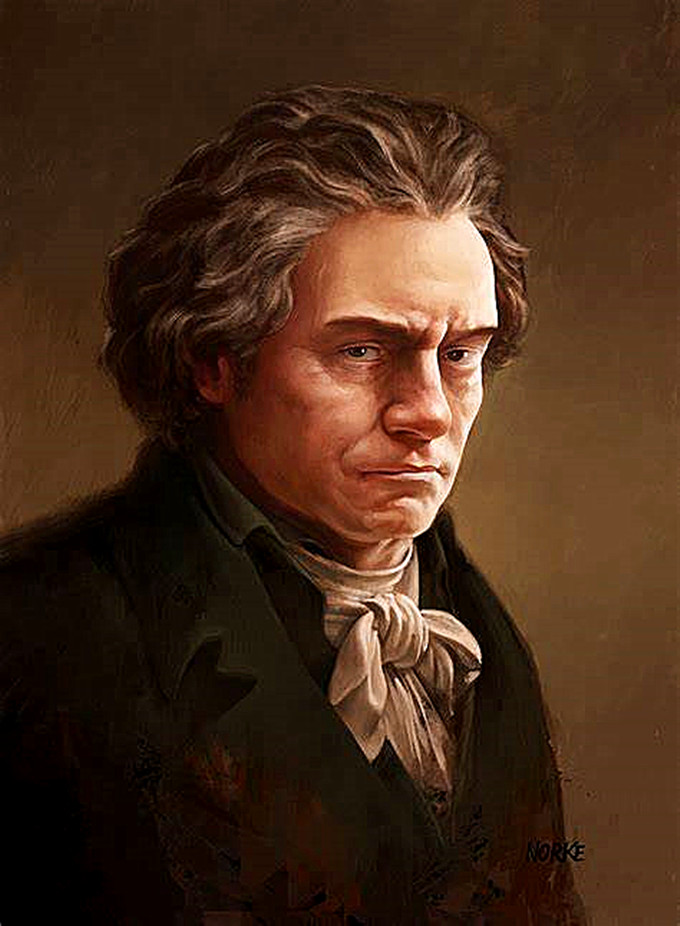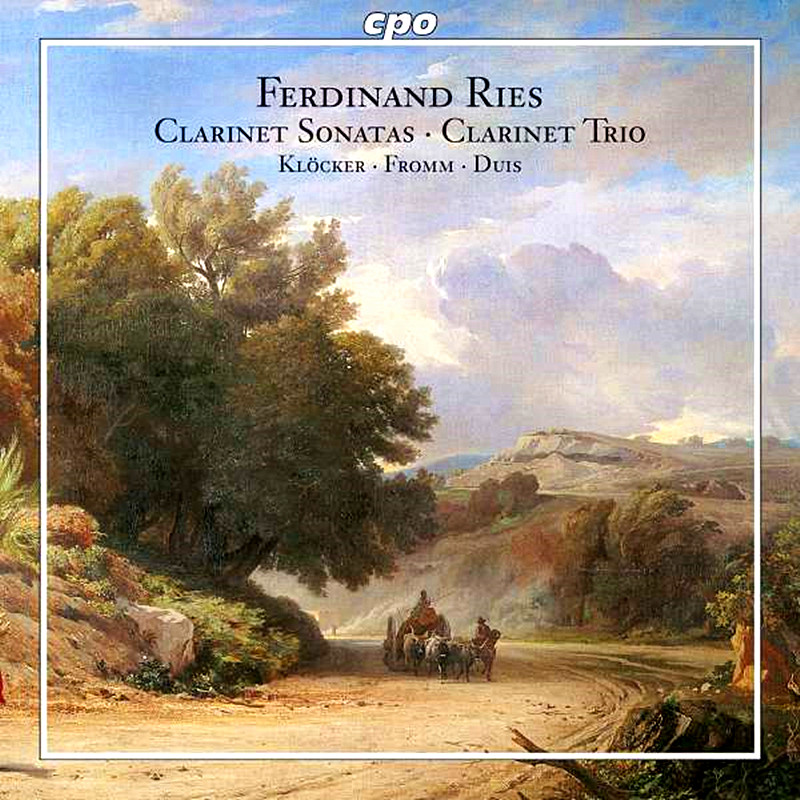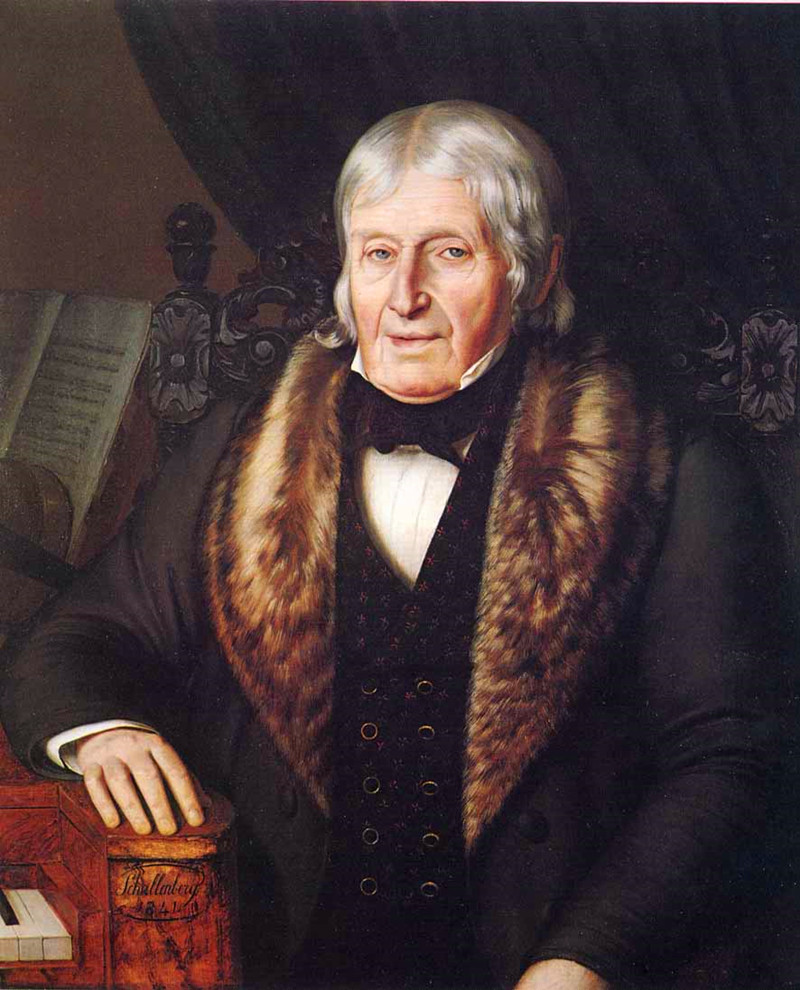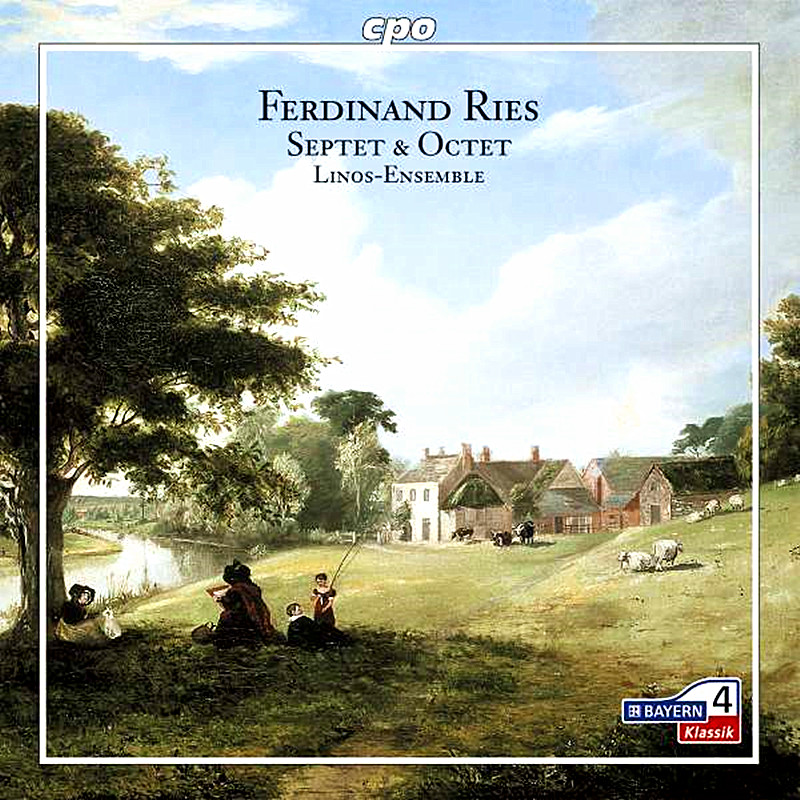| |
|
|
|
|
|
|
|
|
|
|
| |
| |
 |
|
| |
田润德 编译
文/图 2020-09-14 19:36 |
|
| |
|
|
|
|
| |
 |
|
|
|
| |
费迪南德·里斯(Ferdinand Ries
1784-1838 ) |
|
|
|
| |
|
|
| |
费迪南德·里斯 D大调第一交响曲第一乐章 |
|
|
|
| |
Ferdinand Reis Symphony No. 1 in D Major,
First Movement |
|
|
|
| |
|
|
|
|
| |
音乐历史上的今天
1886年9月14日德国小提琴家、作曲家休伯特·里斯(Ries,Hubert)逝世于柏林。
休伯特·里斯(Ries,Hubert 1802-1886)是费迪南德·里斯(Ferdinand Ries 1784-1838
)最年轻的儿子,他是波恩的音乐总监,贝多芬在他的管弦乐队演奏。 休伯特的年迈,更为人所知的他的父亲费迪南德里斯是一位钢琴演奏家和作曲家,曾在维也纳与贝多芬一起学习。
休伯特在与父亲学习小提琴后,继续与路德维希·斯波尔一起学习小提琴,并从着名的老师莫里茨·豪普特曼(Moritz
Hauptmann)那里学习作曲课程,他在柏林度过了大部分时间,在那里他作为各种管弦乐团的音乐会大师享受了职业生涯,然后在柏林担任指挥。
他还担任柏林领先的弦乐四重奏之一多年。 他还是一位着名的教师,他的教学著作仍在使用。
费迪南德·里斯(Ferdinand Ries 1784-1838)
是一位德国作曲家、小提琴家、钢琴家。费迪南德·里斯是音乐世家,他的父亲曾经教过贝多芬小提琴,他长大以后又成了路德维希·凡·贝多芬的朋友、学生和秘书。他创作了8部交响乐、1部小提琴协奏曲、8部钢琴协奏曲、3部歌剧和其他许多作品,其中包括26部弦乐四重奏。1838年,他出版了一本关于他的老师贝多芬的回忆录集,这是他和弗朗茨·维格勒合著的。他的小提琴协奏曲和钢琴协奏曲都被录制下来,其中一些室内乐作品——大部分是用钢琴完成的——由于他与贝多芬的联系,这些作品的风格介于古典和早期浪漫主义风格之间。
今日视频:1、费德南德·里斯D大调第一交响曲第一乐章;2、
休伯特·里斯小提琴曲《无穷动》。
|
|
|
|
| |
 |
|
| |
费迪南德·里斯的儿子小提琴家、作曲家休伯特·里斯(Ries,Hubert 1802-1886) |
|
|
|
| |
费迪南德·里斯(Ferdinand Ries ) |
|
|
|
| |
从1747年起,里斯这个名字就与波恩的音乐联系在了一起。这一年,费迪南德的祖父约翰·里斯(Johann Ries,
1723-1784)被任命为科隆选帝侯的宫廷号手。费迪南德的姑姑安娜•玛利亚是选举法庭上的一名歌手,他的父亲弗朗茨•安东•里斯则是著名的小提琴神童,11岁时便加入了法庭管弦乐队。
费迪南德·里斯是家族中最著名的成员,今天人们之所以记得他,很大程度上是因为他与贝多芬的亲密关系,后者曾与费迪南德的父亲一起学习音乐。里斯于1784年11月28日在波恩接受洗礼,从小就表现出音乐天赋,他跟随父亲学习小提琴和钢琴,并与伯恩哈德·隆伯格一起学习大提琴。法国大革命后的剧变影响了当时许多音乐家的事业,费迪南德也不例外。波恩的选举法庭于1794年被法国解散,结果,费迪南德未能在交响乐团得到他所承诺的职位。他十几岁的大部分时间都是在家里度过的,在他父亲的指导下度过的。他的父亲在失去了选举管弦乐队的工作后,不得不勉强维持生计。1801年,里斯在慕尼黑与彼得·冯·温特呆了几个月,靠拷贝音乐赚钱。他设法攒够了钱去了维也纳。1801年10月,他带着父亲给他以前的学生贝多芬的介绍信到达了维也纳。
在接下来的大约五年里,贝多芬给了里斯很大的帮助,他教他弹钢琴,并让他与维也纳的一些主要音乐家接触,包括上了年纪的阿尔布列奇茨伯格,后者答应教里斯的和声和作曲。在贝多芬的影响下,里斯在巴登的布朗伯爵那里获得了钢琴师的职位。1805年夏天,贝多芬的推荐再次促使里奇诺沃斯基王子在西里西亚的乡间庄园为他提供了一个类似的职位。
1804年7月,里斯作为贝多芬的学生首次公开亮相,在奥加藤用他自己的华彩乐段演奏了C小调钢琴协奏曲,作品37。演出受到了热情的欢迎,发表在《Allgemeine
Musikalische
Zeitung》上的评论评论说,里斯表现出了非常诗意的,富于表现力的风格,以及不寻常的技巧和在轻松克服最困难的段落的自信。
作为对贝多芬帮助的回报,里斯经常担任他的秘书和抄写员,很快成为这位老作曲家最亲密的朋友和顾问之一。贝多芬委托里斯与有意出版他作品的出版商谈判出版条款,这是一项微妙的任务。从1803年到1803年,里斯给波恩出版社Simrock的一系列信件,包括关于作品Op.
31钢琴奏鸣曲和Kreutzer奏鸣曲Op. 47的信件,充分证明了贝多芬对年轻的里斯的信任。
然而,这些快乐的时光很快就结束了。作为波恩的一名公民,费迪南德有义务应征加入法国军队,并于1805年9月被迫离开维也纳。最后,他被拒绝了,因为他在孩提时代服用了天花后失去了一只眼睛的视力。他没有回到维也纳,而是继续前往巴黎,在那里过了两年相当不稳定的生活。1808年,他又回到维也纳,在那里住了一年。
从1809年夏天开始,里斯似乎花了四年时间在欧洲各地巡回演出,去了卡塞尔、汉堡、哥本哈根和斯德哥尔摩,甚至更远的地方,还去了圣彼得堡,在那里他遇见了他以前的大提琴老师,Bernhard
Romberg。1813年4月底,里斯在伦敦度过了他接下来11年的人生。在那里,他结识了乔治·斯玛特爵士和小提琴家约翰·彼得·所罗门,后者是海顿的挚友和赞助人,也是他父亲的老师。所罗门安排他参加爱乐音乐会,里斯于1814年3月14日在那里首次亮相;此后,他的作品频频出现在他们的节目中。在《口琴》上发表的一篇同时代的报道中,可以看出伦敦观众对Ries的高度评价:
|
|
|
|
| |
 |
|
| |
年轻的费迪南德·里斯(Ferdinand Ries ) |
|
|
|
| |
The name Ries was
connected with music in Bonn from 1747, the year Ferdinand's
grandfather, Johann Ries (1723-1784), was appointed court trumpeter to
the Elector of Cologne at Bonn. Ferdinand's aunt, Anna Maria, was a
singer at the electoral court, and his father, Franz Anton Ries, was
renowned as a child prodigy on the violin, competent enough to join the
court orchestra at the age of 11.
Ferdinand Ries is the most celebrated member of the family, and is
remembered today largely because of his close acquaintance with
Beethoven, who had studied music with Ferdinand's father. Ries was
baptised in Bonn on 28 November, 1784, and showed musical promise from
an early age, studying both violin and piano with his father, and the
cello with Bernhard Romberg. The upheavals following the French
Revolution affected the careers of many musicians at this time and
Ferdinand was no exception. The electoral court in Bonn was dissolved by
the French in 1794, and as a result, Ferdinand failed to receive a
position in the orchestra he had been promised. Most of his teenage
years were instead spent at home under the tutelage of his father who
had been forced to scratch a living after losing his job in the
elector's orchestra. In 1801 Ries spent a few months in Munich with
Peter von Winter, earning money by copying music. He managed to save
enough to go to Vienna, and he arrived there in October 1801, armed with
a letter of introduction from his father to his former student,
Beethoven.
The name Ries was
connected with music in Bonn from 1747, the year Ferdinand's
grandfather, Johann Ries (1723-1784), was appointed court trumpeter to
the Elector of Cologne at Bonn. Ferdinand's aunt, Anna Maria, was a
singer at the electoral court, and his father, Franz Anton Ries, was
renowned as a child prodigy on the violin, competent enough to join the
court orchestra at the age of 11.
Ferdinand Ries is the most celebrated member of the family, and is
remembered today largely because of his close acquaintance with
Beethoven, who had studied music with Ferdinand's father. Ries was
baptised in Bonn on 28 November, 1784, and showed musical promise from
an early age, studying both violin and piano with his father, and the
cello with Bernhard Romberg. The upheavals following the French
Revolution affected the careers of many musicians at this time and
Ferdinand was no exception. The electoral court in Bonn was dissolved by
the French in 1794, and as a result, Ferdinand failed to receive a
position in the orchestra he had been promised. Most of his teenage
years were instead spent at home under the tutelage of his father who
had been forced to scratch a living after losing his job in the
elector's orchestra. In 1801 Ries spent a few months in Munich with
Peter von Winter, earning money by copying music. He managed to save
enough to go to Vienna, and he arrived there in October 1801, armed with
a letter of introduction from his father to his former student,
Beethoven. |
|
|
|
| |
 |
|
|
|
| |
贝多芬对费迪南德·里斯的影响 |
|
|
|
| |
导师与学徒
两位音乐家的初次相遇在古典音乐的史册中,路德维希·凡·贝多芬与费迪南德·里斯之间的关系堪称一部关于导师关系、影响力以及艺术发展的精彩篇章。贝多芬作为音乐创作领域的巨匠,不仅塑造了西方古典音乐的发展轨迹,还对同时代的众多艺术家,包括费迪南德·里斯,产生了深远的影响。
费迪南德·里斯出生于 1784 年,是一位德国作曲家、钢琴家和指挥家,他在 19
世纪初接受了贝多芬的指导。里斯的父亲弗朗茨·安东·里斯是一位小提琴手,也是贝多芬的朋友,这为贝多芬与这位年轻的费迪南德之间建立重要的导师与门生关系奠定了基础。
贝多芬对里斯的早期影响
贝多芬对里斯的早期影响在他们最初的几次相遇中就很明显了。里斯本身就是一位才华横溢的音乐家,他深受贝多芬革命性的作曲和演奏方法的启发。年轻的里斯难得有机会观察贝多芬的创作过程,对大师的技巧和音乐哲学有了深入的了解。
贝多芬的指导并不仅仅局限于技术技巧。他还向里斯灌输了一种音乐上的大胆和创新意识,鼓励他超越当时的传统界限进行探索。这种影响是塑造里斯早期作品的关键,这些作品与贝多芬的风格有着明显的相似之处。
里斯音乐风格的演变 摆脱贝多芬的阴影
随着里斯作为作曲家和演奏者的逐渐成熟,他的风格开始发生变化,不再仅仅是模仿贝多芬的作品。这一时期标志着里斯音乐风格的显著转变,他开始在自己的作品中融入自己的想法和个性。
里斯作为作曲家的成长历程可以从他的交响乐、协奏曲和室内乐作品中得以体现。虽然他的早期作品深受贝多芬结构和主题的影响,但他的后期作品则展现出更为独特的风格。里斯开始探索形式和和声,借鉴了其他当代作曲家的元素,并融入了自己独特的视角。
贝多芬晚期风格的影响
贝多芬的晚期风格以更加内省和复杂的表现手法为特点,这也对里希产生了影响。在这一时期,贝多芬创作了一些他最深刻的作品,包括晚期的弦乐四重奏和《迪亚贝利变奏曲》。里希目睹了这些发展,吸收了这种风格的元素,这在他的后期作品中体现为更高的复杂性和更丰富的情感深度。
里希对贝多芬晚期风格的借鉴并非仅仅是简单的复制。相反,他将这些影响作为进一步发展自己音乐语言的起点,将所学的元素与个人的艺术理念相结合。
贝多芬对费迪南德·里斯职业生涯和遗产的影响
里斯作为贝多芬火炬的传承者
与贝多芬的交往对里斯的职业生涯和遗产产生了深远的影响。里斯成为了将贝多芬的作品和风格传递给下一代音乐家的重要人物。他与贝多芬的亲身接触赋予了他独特的见解,这些见解通过他的演奏、教学和著述得以展现。
里斯在推广贝多芬作品方面所做的努力,包括出版一些贝多芬鲜为人知的作品,对巩固贝多芬的遗产起到了至关重要的作用。他对贝多芬生平和作品的详细描述,特别是《贝多芬笔记》中所呈现的内容,是理解贝多芬音乐和个性的宝贵资源。
费迪南德·里斯对浪漫主义运动的贡献
费迪南德·里斯通常被视为音乐从古典时期到浪漫时期的桥梁。他的作品虽然根植于他从贝多芬那里学到的古典传统,但也融合了浪漫主义时期所具有的情感表达和个性特征。
这种风格的融合在里斯的钢琴协奏曲和室内乐作品中尤为明显。这些作品既体现了古典时期的结构清晰性,又展现了浪漫主义时期的抒情性和表现力。里埃斯将这些元素和谐统一的能力,彰显了他在那个时代音乐领域中的独特地位。
贝多芬对费迪南德·里斯音乐的深远影响
直至今日,贝多芬对里斯音乐的影响仍是音乐学家和古典音乐爱好者们关注的焦点。尽管里斯从未达到其导师那样的知名度,但他的作品因其创新性和情感深度而越来越受到认可。
总之,路德维希·凡·贝多芬的指导和影响在塑造费迪南德·里斯的音乐历程中起到了关键作用。从一名专注的学生汲取大师的教诲,到成为一位独立的创新作曲家,里斯的职业生涯反映了贝多芬对其同时代人的深远影响。他们的关系不仅凸显了艺术领域中导师指导的重要性,还展示了从一代到下一代的音乐风格和理念的演变。
遗产与认可
里斯在传承贝多芬遗产中的作用
费迪南德·里斯在传承和推广贝多芬的遗产方面发挥了关键作用。他对贝多芬作品的详细描述、教学方法以及个人生活的记录提供了关于这位大师世界的宝贵见解。里埃的著作提供了一种独特的视角,将这位传奇作曲家与现代世界紧密地联系在了一起。
费迪南德·里斯对后世的影响
尽管里埃斯从未达到贝多芬那样的声名高度,但他的影响却波及到了下一代作曲家。他的教学和作品融合了贝多芬的革新思想,并融入了自己的创新元素,从而对浪漫主义运动乃至更广泛的领域产生了影响。
认可与重新发现
近年来,人们对费迪南德·里埃斯在古典音乐领域所做出的贡献有了越来越多的了解。以他的作品为主题的音乐会以及对他的作品的新唱片发行,使他的音乐重新回到了公众的视野中,凸显了他在从古典时代向浪漫主义时代过渡过程中的作用。结论
贝多芬与里斯之间的永恒纽带
路德维希·凡·贝多芬与费迪南德·里斯之间的关系证明了导师关系和艺术影响力的力量。贝多芬对里斯的影响不仅限于教授他作曲技巧;还包括灌输创新精神和情感表达的理念,而里斯也将这些理念融入了自己的音乐创作中。
费迪南德·里斯在音乐史上的独特地位
费迪南德·里斯在音乐史上占据着独特的地位,他处于两个重要音乐时代交汇的节点上。他的作品融合了贝多芬的影响和他自己的创作风格,代表了 18
世纪古典传统与 19 世纪蓬勃发展的浪漫主义之间的桥梁。
对贝多芬与费迪南德·里斯之间音乐关系的持续探索
对于音乐学家和古典音乐爱好者而言,探究贝多芬对费迪南德·里斯的影响仍是一个不断深入的过程。随着里斯作品的演出和录制越来越多,这位导师与门徒之间的关系的深度和细微之处也在不断展现出来,为古典音乐的发展提供了新的见解。
总之,路德维希·凡·贝多芬与费迪南德·里斯之间的艺术关系体现了导师对门徒的深远影响。这种关系不仅塑造了里斯的职业生涯,还对音乐界产生了重大贡献,其影响跨越了时代,继续激励着未来的音乐家和作曲家。
|
|
|
|
| |
 |
|
|
|
| |
费迪南德·里斯 单簧管奏鸣曲 单簧管三重奏 来自杜伊斯的克洛克 |
|
|
|
| |
|
|
|
|
| |
Beethoven’s
Influence on Ferdinand Ries
The Mentor and the Protégé
The Early Meeting of Two Musical Minds
In the annals of classical music, the relationship between Ludwig van
Beethoven and Ferdinand Ries stands as a fascinating study of
mentorship, influence, and artistic evolution. Beethoven, a titan of
musical composition, not only shaped the course of Western classical
music but also profoundly impacted the lives and careers of his
contemporaries, including Ferdinand Ries.
Beethoven’s Early Impact on Ries
The early influence of Beethoven on Ries was evident in their first few
encounters. Ries, a talented musician in his own right, was deeply
inspired by Beethoven’s revolutionary approach to composition and
performance. The young Ries had the rare opportunity to observe
Beethoven’s compositional process, gaining insights into the master’s
techniques and musical philosophies.
The Evolution of Ries’ Musical Identity
Breaking Free from Beethoven’s Shadow
As Ries matured as a composer and performer, his style began to evolve,
moving beyond mere imitation of Beethoven. This period marked a
significant shift in Ries’ musical identity, as he started to infuse his
compositions with his own ideas and character.
Ries’ growth as a composer can be traced through his symphonies,
concertos, and chamber music. While his early works were heavily
influenced by Beethoven’s structures and motifs, his later compositions
showcased a more distinct voice. Ries began to experiment with form and
harmony, incorporating elements from other contemporary composers and
his own unique perspective.
The Influence of Beethoven’s Late Style
Beethoven’s late style, characterized by a more introspective and
complex approach, also left a mark on Ries. During this period,
Beethoven composed some of his most profound works, including the late
string quartets and the “Diabelli Variations.” Ries, witnessing these
developments, absorbed elements of this style, which can be seen in the
increased complexity and emotional depth of his later works.
Ries’ adaptation of Beethoven’s late style did not result in mere
replication. Instead, he used these influences as a springboard to
further develop his own musical language, blending the learned elements
with his personal artistic vision.
The Impact on Ries’ Career and Legacy
Ries as a Carrier of Beethoven’s Torch
The relationship with Beethoven had a lasting impact on Ries’ career and
legacy. Ries became an important figure in the transmission of
Beethoven’s works and style to the next generation of musicians. His
firsthand experience with Beethoven gave him unique insights, which he
shared through his performances, teaching, and writings.
Ries’ efforts in promoting Beethoven’s works, including the publication
of some of Beethoven’s lesser-known pieces, played a crucial role in
cementing Beethoven’s legacy. His detailed accounts of Beethoven’s life
and works, particularly in the “Notizen zu Beethoven” (Notes on
Beethoven), are invaluable resources for understanding Beethoven’s music
and persona.
Ries’ Contribution to the Romantic Movement
Ferdinand Ries is often considered a bridge between the Classical and
Romantic eras in music. His works, while rooted in the classical
tradition he learned from Beethoven, also embraced the emotional
expressiveness and individualism that characterized the Romantic
movement.
This blending of styles is particularly evident in Ries’ piano concertos
and chamber works. These compositions reflect both the structural
clarity of the Classical era and the emotive, expressive qualities of
Romanticism. Ries’ ability to harmonize these elements demonstrates his
unique position in the musical landscape of his time.
The Enduring Influence of Beethoven on Ries’ Music
To this day, the influence of Beethoven on Ries’ music remains a subject
of interest for musicologists and classical music enthusiasts. While
Ries never achieved the same level of fame as his mentor, his works are
increasingly being recognized for their innovation and emotional depth.
In conclusion, the mentorship and influence of Ludwig van Beethoven
played a pivotal role in shaping the musical journey of Ferdinand Ries.
From a dedicated student absorbing the teachings of a master to an
innovative composer in his own right, Ries’ career reflects the profound
impact Beethoven had on his contemporaries. Their relationship not only
highlights the importance of mentorship in the arts but also showcases
the evolution of musical styles and ideas from one generation to the
next.
Legacy and Recognition
Ries’ Role in Preserving Beethoven’s Legacy
Ferdinand Ries played a crucial role in preserving and promoting
Beethoven’s legacy. His detailed accounts of Beethoven’s compositions,
teaching methods, and personal life have provided invaluable insights
into the maestro’s world. Ries’ writings offer a unique perspective,
bridging the gap between the legendary composer and the modern world.
Ries’ Influence on Future Generations
While Ries never achieved the same level of fame as Beethoven, his
influence extended to the next generation of composers. His teaching and
compositions carried the essence of Beethoven’s revolutionary ideas,
blended with his own innovations, thereby influencing the Romantic
movement and beyond.
Recognition and Rediscovery
In recent years, there has been a growing recognition of Ferdinand Ries’
contributions to classical music. Concerts featuring his works and new
recordings of his compositions have brought his music back to public
attention, highlighting his role in the transition from the Classical to
the Romantic era.
Conclusion
The Enduring Bond Between Beethoven and Ries
The relationship between Ludwig van Beethoven and Ferdinand Ries is a
testament to the power of mentorship and artistic influence. Beethoven’s
impact on Ries went beyond teaching him the craft of composition; it
involved instilling a spirit of innovation and emotional expression that
Ries carried forward in his own music.
Ries’ Unique Place in Music History
Ferdinand Ries holds a unique place in music history, standing at the
crossroads of two significant musical eras. His works, infused with
Beethoven’s influence and his own creative voice, represent a bridge
between the classical traditions of the 18th century and the burgeoning
Romanticism of the 19th century.
The Ongoing Exploration of Their Musical Relationship
The exploration of Beethoven’s influence on Ferdinand Ries remains an
ongoing journey for musicologists and classical music enthusiasts. As
more of Ries’ works are performed and recorded, the depth and nuances of
this mentor-protégé relationship continue to unfold, offering fresh
insights into the evolution of classical music.
In summary, the artistic relationship between Ludwig van Beethoven and
Ferdinand Ries exemplifies the profound impact a mentor can have on a
protégé. This bond not only shaped Ries’ career but also contributed
significantly to the musical world, echoing through the ages and
continuing to inspire future generations of musicians and composers.
|
|
|
|
| |
 |
|
|
|
| |
现代AI为伟大的费迪南德·里斯做画像 |
|
|
|
| |
Modern AI creates a portrait
of the great Ferdinand Ries |
|
| |
|
|
|
|
| |
费迪南德·里斯先生被誉为当今最好的钢琴演奏家之一,这是公正的。他的手是有力的,他的行动是肯定的,经常令人惊讶。但他的演奏最与众不同的是其浪漫的野性……他对那些进入他的风格的人产生了影响,这只能与风琴声最意想不到的组合和过渡相比。
在伦敦的这些年里,费迪南德·里斯和贝多芬的联系一直在继续,事实上,从1815年开始,费迪南德·里斯似乎代表了贝多芬的利益,与各种伦敦出版商努力出版他的作品。不久,里斯成了贝多芬许多晚期作品在伦敦出版的关键人物。此外,费迪南德·里斯为了贝多芬的利益所做的努力导致了各种各样的委托,以贝多芬的方式进行,包括1822年来自爱乐协会的一个交响乐团。两年后,合唱交响曲的乐谱被送到了协会。贝多芬在1825年7月写的一封信中承认了里斯在这些事情中所扮演的角色:“由于我的朋友里斯不在伦敦,我自己也不寄任何东西到那里,因为信件和安排占据了我太多的时间。”
1824年,费迪南德·里斯决定退休,离开伦敦回到他的家乡莱茵兰,过一种更安静的生活。他在戈德斯伯格——波恩以南几英里的一个村庄——住了将近三年。之后,他决定搬到法兰克福,在那里,他作为作曲家和指挥家参与了莱茵河下游的几个音乐节。1834年,他被任命为亚琛市管弦乐团和Singakademie乐团的负责人。费迪南德·里斯于1838年1月13日去世,享年53岁。 |
|
|
|
| |
 |
|
|
|
| |
晚年的费迪南德·里斯先生 |
|
|
|
| |
Mr. Ferdinand Riss in his later years |
|
|
|
| |
Kaikhosru Mr Ries
is justly celebrated as one of the finest piano-performers of the
present day. His hand is powerful, and his action is certain, often
surprising. But his playing is most distinguished from that of all
others by its romantic wildness.... He produces an effect upon those who
enter his style, which can only be compared to that arising from the
most unexpected combinations and transitions of the Aeolian harp.
Ries's contact with Beethoven continued during these London years, and
indeed from about 1815, Ries appears to have represented Beethoven's
interests with the various London publishers striving to publish his
works. In time Ries became a key figure in the London publication of
many of Beethoven's late compositions. Moreover, Ries's efforts on
Beethoven's behalf resulted in various commissions going Beethoven's
way, including one in 1822 from the Philharmonic Society for a symphony.
Two years later the score of the Choral Symphony was delivered to the
Society. In a letter written in July 1825 Beethoven himself acknowledged
the role Ries had played in these matters: "Since my friend Ries is no
longer in London, I don't send anything there myself, as the
correspondence and arrangements take up too much of my time."
In 1824 Ries decided to retire, and left London to return to a quieter
existence in his native Rhineland, living for almost three years in
Godesberg, a village a few miles south of Bonn. He then decided to move
to Frankfurt am Main where he became involved with several of the Lower
Rhine Music Festivals as composer and conductor. In 1834 he was
appointed head of the city orchestra and Singakademie in Aachen. Ries
died at the age of 53 on 13 January, 1838. |
|
|
|
| |
 |
|
| |
德国对里斯的成就十分重视,建立了费迪南德·里斯研究学会 |
|
|
|
| |
Germany highly values Riss's
achievements and has established the Ferdinand Riss Research Society. |
|
|
|
| |
|
|
|
|
| |
Today in the
history of music
On September 14, 1886, German violinist and composer Hubert Ries passed
away in Berlin.
Hubert Ries (1802-1886) was the youngest son of Ferdinand Ries
(1784-1838). He was the music director of Bonn and performed with
Beethoven's orchestra. Hubert's old age was better known for his father
Ferdinand Ries, who was a pianist and composer and had studied with
Beethoven in Vienna. After learning the violin from his father, Hubert
continued to study the violin with Ludwig Spohr and took composition
courses from the renowned teacher Moritz Hauptmann. He spent most of his
time in Berlin, where he enjoyed a career as a concert master of various
orchestras and then served as the conductor in Berlin. He also served as
the leader of one of Berlin's leading string quartets for many years. He
was also a famous teacher and his teaching works are still in use.
Ferdinand Ries (1784-1838) was a German composer, violinist and pianist.
Ferdinand Ries was a friend, student and secretary of Ludwig van
Beethoven. He composed 8 symphonies, 1 violin concerto, 8 piano
concertos, 3 operas and many other works, including 26 string quartets.
In 1838, he published a memoir collection about his teacher Beethoven,
which was co-authored by him and Franz Wegler. His violin concerto and
piano concerto were recorded, and some of his chamber music works - most
of which were completed with the piano - due to his connection with
Beethoven, the style of these works lies between the classical and early
romantic styles.
Today's video: 1. Ferdinand Reis' Symphony No. 1 in D Major, First
Movement; 2. Hubert Reis' Violin Piece "Infinite Motion". |
|
|
|
| |
 |
|
|
|
| |
休伯特·里斯(Ries,Hubert)关于小提琴的教学著作 |
|
|
|
| |
Hubert Ries's teaching works
on the violin |
|
|
|
| |
 |
|
|
|
| |
费迪南德·里斯的七重奏和八重奏 |
|
|
|
| |
Ferdinand Reis' septets and
octets |
|
|
|
| |
|
|
| |
|
|
| |
里斯 无穷动 小提琴曲Ries_Perpetual Motion |
|
|
|
| |
曲目:Perpetual Motion,无穷动
作者:Ferdinand Ries,德国作曲家,贝多芬的朋友、学生和秘书。
演奏信息:
Elizabeth Pitcairn, violin Artie Kane, piano
Whidbey Island Center for the Arts Amadeus Concert.
虽然帕格尼尼的无穷动流传更广,可是这首也不错哦。演奏者也很棒。
|
|
|
|
| |
|
|
|
|
| |
未得原作者编者授权严禁转载www.mt77.com任何内容 |
|
|
|
|
|
|
|
|
|
|
|
|
|
|


